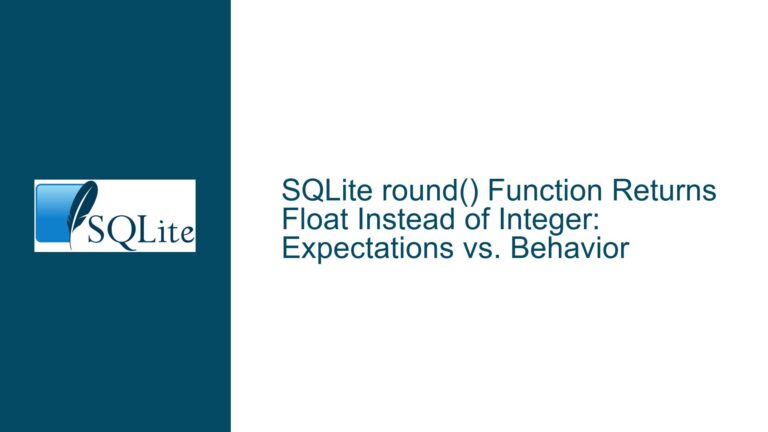Resolving Nested CASE Statement Issues Caused by Trailing Spaces in SQLite
Issue Overview: Mismatched Conditions Due to Trailing Spaces
The core issue arises when a nested CASE statement fails to apply expected updates to rows where DEPTNO = 'C01' and JOB matches specific roles (e.g., 'ANALYST' or 'MANAGER'). Instead of updating the COMM value as intended, these rows receive COMM = NULL.
Key Observations:
- The
CASEstatement works correctly for departments other than'C01'. - For
DEPTNO = 'C01', the nestedCASEevaluatesJOBvalues but returnsNULLeven whenJOBappears to match. - The
JOBcolumn’s data originates from a DB2 system and is stored asCHAR(8)in SQLite, which pads values with trailing spaces to meet the fixed length. For example,'ANALYST'(length 7) becomes'ANALYST '(length 8).
Root Cause:
The mismatch occurs because the CASE statement compares JOB values (e.g., 'ANALYST') against stored CHAR(8) values with trailing spaces. SQLite performs exact string comparisons by default, so 'ANALYST' (no trailing space) ≠ 'ANALYST ' (trailing space). This discrepancy triggers the ELSE NULL clause.
Possible Causes of the Mismatch
1. Trailing Spaces in Fixed-Length CHAR Columns
CHAR(n)pads values with trailing spaces to enforce fixed-length storage. For example,'ANALYST'becomes'ANALYST '.- Explicit comparisons in
CASEstatements fail unless trailing spaces are explicitly included (e.g.,WHEN 'ANALYST ' THEN).
2. Incorrect Collation Settings
- SQLite’s default collation (
BINARY) treats trailing spaces as significant. Comparisons like'ANALYST' = 'ANALYST 'returnfalse. - The
RTRIMcollation, which ignores trailing spaces during comparisons, is not applied by default.
3. Data Import/Export Artifacts
- Data migrated from systems like DB2 may retain trailing spaces in
CHARcolumns. - Tools or scripts that trim strings during migration can introduce inconsistencies.
4. Ambiguous Column Definitions
- Using
CHAR(n)instead ofTEXT(variable-length) forces padding, creating hidden trailing spaces.
Troubleshooting Steps, Solutions & Fixes
Step 1: Diagnose Trailing Spaces
Use QUOTE() to inspect stored values and identify trailing spaces:
SELECT quote(job), quote('ANALYST') FROM emp WHERE deptno = 'C01';
Output Example:
quote(job)='ANALYST '(trailing space)quote('ANALYST')='ANALYST'(no trailing space)
Interpretation:
The stored JOB value includes a trailing space, causing the CASE condition to fail.
Step 2: Resolve Trailing Space Mismatches
Option 1: Modify the CASE Statement to Include Trailing Spaces
Explicitly append spaces to match CHAR(8) values:
CASE job
WHEN 'ANALYST ' THEN (comm * 1.3) -- Add trailing space
WHEN 'MANAGER ' THEN (comm * 1.4) -- Add trailing space
ELSE NULL
END
Limitation: Hardcoding spaces is brittle and error-prone.
Option 2: Use TRIM() to Remove Trailing Spaces
Trim JOB values before comparison:
CASE TRIM(job)
WHEN 'ANALYST' THEN (comm * 1.3)
WHEN 'MANAGER' THEN (comm * 1.4)
ELSE NULL
END
Trade-off: Adds computational overhead but ensures accurate comparisons.
Option 3: Apply RTRIM Collation
Modify the column’s collation to ignore trailing spaces during comparisons:
-- Redefine the JOB column with RTRIM collation
CREATE TABLE emp_new (
...,
job TEXT COLLATE RTRIM,
...
);
-- Migrate data
INSERT INTO emp_new SELECT * FROM emp;
DROP TABLE emp;
ALTER TABLE emp_new RENAME TO emp;
Advantage: Comparisons like job = 'ANALYST' automatically ignore trailing spaces.
Option 4: Update Data to Remove Trailing Spaces
Clean trailing spaces permanently:
UPDATE emp SET job = TRIM(job) WHERE deptno = 'C01';
Best Practice: Use TRIM() during data migration to avoid padding issues.
Step 3: Prevent Future Issues
Recommendation 1: Avoid CHAR(n) in SQLite
Use TEXT instead of CHAR(n) to store variable-length strings without padding:
CREATE TABLE emp (
...,
job TEXT, -- No trailing spaces
...
);
Recommendation 2: Validate Data During Migration
Ensure migrated data does not include unintended trailing spaces:
-- Trim all CHAR columns during import
INSERT INTO emp (job, ...)
SELECT TRIM(job), ... FROM external_db;
Recommendation 3: Use Consistent Collation
Define TEXT columns with COLLATE RTRIM to standardize comparisons:
CREATE TABLE emp (
...,
job TEXT COLLATE RTRIM,
...
);
Summary
The issue stems from trailing spaces in CHAR(8) values causing exact string comparisons to fail in the CASE statement. Solutions include trimming data, adjusting collation, or avoiding fixed-length text types. For long-term stability, migrate to TEXT columns with RTRIM collation and validate data during imports.
By addressing trailing spaces and aligning collation settings, nested CASE logic will function as intended, ensuring accurate commission calculations for all departments.






